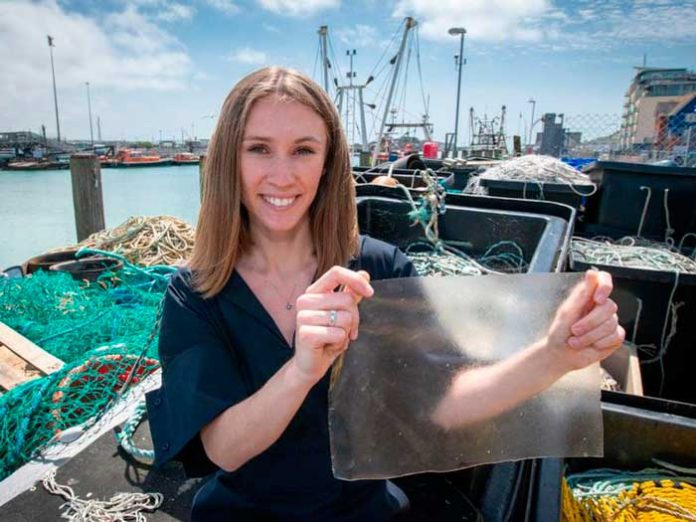Problems of environmental pollution have topped the study of the world’s leading research centers. Especially welcome is the use of an integrated solution, such as that proposed by a researcher from the University of Sussex in the UK, who suggested using the waste of the fishing industry for the manufacture of a special type of biological plastic that can replace traditional plastic products. The presentation of the MarinaTex material allowed 24-year-old Lucy Hughes to win the James Dyson Award 2019.
The fishing industry produces gigantic volumes of waste, England alone throws almost 500 thousand tons of by-products per year into a landfill. These are fish blood, scales, shells and skin. The young researcher came to the conclusion that strong protein structures of scales and skin can be used in the manufacture of plastic.
To integrate the proteins “extracted” from fish waste into a single whole, Hughes used an organic binder component. At the same time, in order to reduce transportation costs, it was necessary to find the material located not far from the waste collection site of the fishing industry. Such a material was agar produced from red algae. After numerous experiments conducted under the usual conditions of the kitchen, Hughes received MarinaTex biodegradable biological plastic.
To look at it, the new bioplastic is difficult to distinguish from traditional plastic – it is a transparent and thin, odorless material. You can use MarinaTex when packaging or for the production of disposable household items.
It is noteworthy that the production of bioplastics requires a minimum amount of energy: the working process temperature is only 100 degrees Celsius. The material decomposes in just 4-6 weeks and does not emit any harmful by-products. Simultaneously, the girl solves the problem of utilizing a huge amount of waste from the fishing industry. Thus, for the release of 1400 standard packages, waste from the processing of one fish, Atlantic cod, will be required.
As a result of winning the James Dyson Award 2019, Lucy Hughes received a prize of £30,000 ($39,000), which she intends to use to further develop MarinaTex’s release technology. The first packages made from the fishing industry waste can enter the market as early as 2021.







